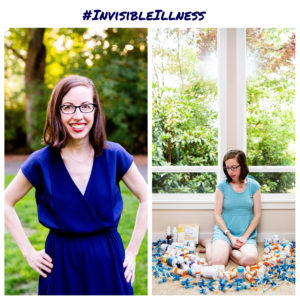A New Way to interpret “But You Don’t Look Sick”
I am happy to report that I am now blogging on the Creaky Joints website. Creaky Joints is a nonprofit that provides information sharing, support, and advocacy resources for persons with arthritis and related conditions, many of which are chronic, invisible illnesses.
My first blog post was A New Way to Interpret “But You Don’t Look Sick – please note the link is currently broken but I’m told it will be fixed soon (as of 10/2019). While we’re waiting for it to be back up, I’ve posted the text for this post below.
————————————————————————————————————–
When I communicate my diagnosis of rheumatoid arthritis to someone for the first time, I’m often told that I “don’t look sick.” Many people understandably feel that being told they don’t look sick is delegitimizing. It is easy to interpret the statement to mean, “You don’t LOOK sick, so you can’t really BE sick.” This is particularly tempting for invisible illness sufferers, as most have struggled to get appropriate diagnoses and have at some point been told that their disease was all in their head.

However, I would like to propose an alternative way of interpreting the “you don’t look sick” response. This was sparked when I recently learned that someone I’ve known for over a year has Multiple Sclerosis (MS). My first gut reaction, even after thirteen years of listening to people tell ME I don’t look sick, was: “But you don’t LOOK like you have MS!”
What happened in the blink of an eye when I heard that my friend had MS? I was experiencing something called “cognitive dissonance,” or the uncomfortable feeling of trying to hold two disparate/conflicting thoughts in my mind simultaneously. I had a mental image that this friend was in good health; this image was threatened when I learned the reality that she has a medical condition, and my thought that she “doesn’t look sick” arose from my brain struggling to hold these two separate but conflicting thoughts in mind simultaneously. In order to reconcile these two competing thoughts, I had to minimize my longer and more developed concept of my friend as “healthy,” so the idea of her “having MS” could become more fully formed and sink in.
Reflecting on this experience has helped me be more open minded to someone’s reaction when hearing my diagnosis for the first time. It is understandable that those of us with invisible illnesses feel defensive when we are told we “don’t look sick.” However, sometimes the statement is really more about the speaker needing a little time to process this news, than it is a lasting statement or critique of the patient. I see the statement as more about the person learning this information going through a rapid mental process of surprise, disbelief, and acceptance, rather than them deflecting or minimizing the speaker’s reality. In that moment, I have a choice about how I can interpret their statement that I “don’t look sick;” I can be defensive, or I can see that statement as a bridge to their ultimate acceptance/learning about the disease. I often say, “I know, I don’t feel like I look sick either, but I guess you just can’t tell from looking at someone, right?” and then I offer to answer any questions they may have.
Having said that, sometimes people who learn of an invisible illness are truly skeptical or negative; that is a whole different phenomenon. In fact, the discomfort of cognitive dissonance can lead the listener to delegitimize the diagnosis in an effort to reduce their cognitive dissonance. These cases are truly sad and unfortunate. In pointing out the more neutral interpretation of “but you don’t look sick,” I do not want to delegitimize or minimize the cases where the words hold a more negative meaning. I simply wish to point out that the statement itself, while it seems loaded with lasting meaning, is often much more transitory on the part of the speaker as they take a few minutes to come to terms with what you have told them.
In short: the statement “but you don’t look sick” can mean a lot of different things depending on the speaker’s intent. I personally feel more empowered when I approach the speaker with an open mind, rather than concluding that they are attempting to delegitimize me. I try to put myself in the speaker’s shoes, and remind myself what it was like for me before I knew about rheumatoid arthritis and other invisible illnesses. Only time and further conversation can tell whether they are open to accepting my reality of “being” but not “looking” sick.
No Comments
Barbara Israel
Hello there! Just came across your blog. I am an RA warrior with other lovely diseases that want to come along for the ride. I also live near Seattle, in Lake Forest Park. I have found it difficult to connect with other chronically ill patients near me except support groups which seems to be contests as to whom has the most or worst diseases. Not my cup of tea. I really appreciate your take on the “but you don’t look sick” statement. I am guilty of feeling frustrated and dismissed. However, perhaps you are correct in that they are just processing. I shall keep that theory in mind. Thanks for your wise words.